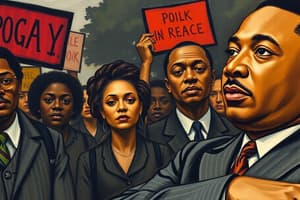Podcast
Questions and Answers
Who was known for his philosophy of nonviolent resistance during the Civil Rights Movement?
Who was known for his philosophy of nonviolent resistance during the Civil Rights Movement?
- Rosa Parks
- Harriet Tubman
- Malcolm X
- Martin Luther King Jr. (correct)
What did Rosa Parks initiate that led to the Montgomery Bus Boycott?
What did Rosa Parks initiate that led to the Montgomery Bus Boycott?
- Sit-ins
- Refusal to give up her seat on a bus (correct)
- Freedom Rides
- Civil Disobedience Campaign
Which event was a direct challenge to segregated seating on public transportation?
Which event was a direct challenge to segregated seating on public transportation?
- Montgomery Bus Boycott (correct)
- Sit-ins
- Freedom Rides
- March on Washington
Who influenced millions with his teachings and call for self-determination during the Civil Rights Movement?
Who influenced millions with his teachings and call for self-determination during the Civil Rights Movement?
What was the main strategy employed by Martin Luther King Jr. in the Civil Rights Movement?
What was the main strategy employed by Martin Luther King Jr. in the Civil Rights Movement?
Which group of activists tested the enforcement of the Supreme Court's ruling banning segregation on interstate travel?
Which group of activists tested the enforcement of the Supreme Court's ruling banning segregation on interstate travel?
Which event led to the establishment of the Mississippi Freedom Democratic Party?
Which event led to the establishment of the Mississippi Freedom Democratic Party?
Which legislation outlawed discriminatory voting practices and enforced voting rights for racial minorities?
Which legislation outlawed discriminatory voting practices and enforced voting rights for racial minorities?
In which city did conflict and violence escalate during the 'Birmingham Campaign'?
In which city did conflict and violence escalate during the 'Birmingham Campaign'?
What was the main focus of the March on Washington in 1963?
What was the main focus of the March on Washington in 1963?
Which federal law prohibited discrimination based on race, color, religion, sex, or national origin in public accommodations?
Which federal law prohibited discrimination based on race, color, religion, sex, or national origin in public accommodations?
What is one significant legacy of the Civil Rights Movement that inspired future generations?
What is one significant legacy of the Civil Rights Movement that inspired future generations?
Flashcards are hidden until you start studying
Study Notes
Unfolding a Chapter in History: The Civil Rights Movement
The Civil Rights Movement, a remarkable period in American history, transformed the nation and established vital milestones in the fight for equality, justice, and human dignity for all. Spanning from the 1950s to the 1960s, this era witnessed a determined and nonviolent struggle against segregation, disenfranchisement, and other forms of discrimination.
Origins and Key Players
The Civil Rights Movement evolved from the collective efforts and demands of African Americans and their allies. A pivotal figure in this movement was Martin Luther King Jr., known for his philosophy of nonviolent resistance and his inspiring "I Have a Dream" speech. Other notable figures include Rosa Parks, who initiated the Montgomery Bus Boycott, and Malcolm X, whose teachings and call for self-determination influenced millions.
Significant Events
The Civil Rights Movement gave birth to various landmark events and legislative achievements. Among them:
-
Montgomery Bus Boycott (1955-1956): A direct challenge to segregated seating on public transportation, initiated by Rosa Parks and led by Martin Luther King Jr.
-
Sit-ins (1960-1961): Peaceful demonstrations by African American students, refusing to leave segregated lunch counters in the South.
-
Freedom Rides (1961): A group of activists tested the enforcement of the Supreme Court's ruling banning segregation on interstate travel.
-
Freedom Summer (1964): A voter registration campaign that led to the establishment of the Mississippi Freedom Democratic Party.
-
March on Washington (1963): A massive peaceful rally on the National Mall, where Martin Luther King Jr. delivered his iconic speech "I Have a Dream."
-
Voting Rights Act (1965): A federal law that outlawed discriminatory voting practices and enforced voting rights for racial minorities.
-
Civil Rights Act (1964): A landmark legislation that prohibited discrimination based on race, color, religion, sex, or national origin in public accommodations, employment, and federal financial assistance.
Challenges and Obstacles
The Civil Rights Movement did not unfold without opposition. Many Americans, including elected officials, opposed the movement. White supremacist groups like the Ku Klux Klan and other extremist groups instigated violence and intimidation against African Americans.
Conflict and violence escalated in places like Birmingham, Alabama, during what is known as "Birmingham Campaign," as well as during the March from Selma to Montgomery, which led to the infamous "Bloody Sunday" incident.
Legacy
The Civil Rights Movement not only prompted transformative legislative achievements but also inspired future generations to continue the fight for equality, justice, and human dignity. Its far-reaching impact is evidenced by the profound influence it had on international human rights movements and the creation of the United Nations' Universal Declaration of Human Rights.
The Civil Rights Movement demonstrates the power of nonviolent resistance, the importance of unity and solidarity, and the significance of grassroots activism. Its legacy endures, inspiring individuals to challenge injustice, stand up for their rights, and change the world for the better. The Civil Rights Movement, Encyclopædia Britannica, www.britannica.com/event/Civil-Rights-Movement The Civil Rights Movement, National Park Service, www.nps.gov/subjects/civilrights/index.htm Civil Rights Act of 1964, National Archives, www.archives.gov/education/lessons/civil-rights-act Voting Rights Act of 1965, National Archives, www.archives.gov/education/lessons/voting-rights-act Freedom Riders, National Park Service, www.nps.gov/subjects/civilrights/freedomriders.htm Freedom Summer, National Park Service, www.nps.gov/subjects/civilrights/freedomsummer.htm
Studying That Suits You
Use AI to generate personalized quizzes and flashcards to suit your learning preferences.




